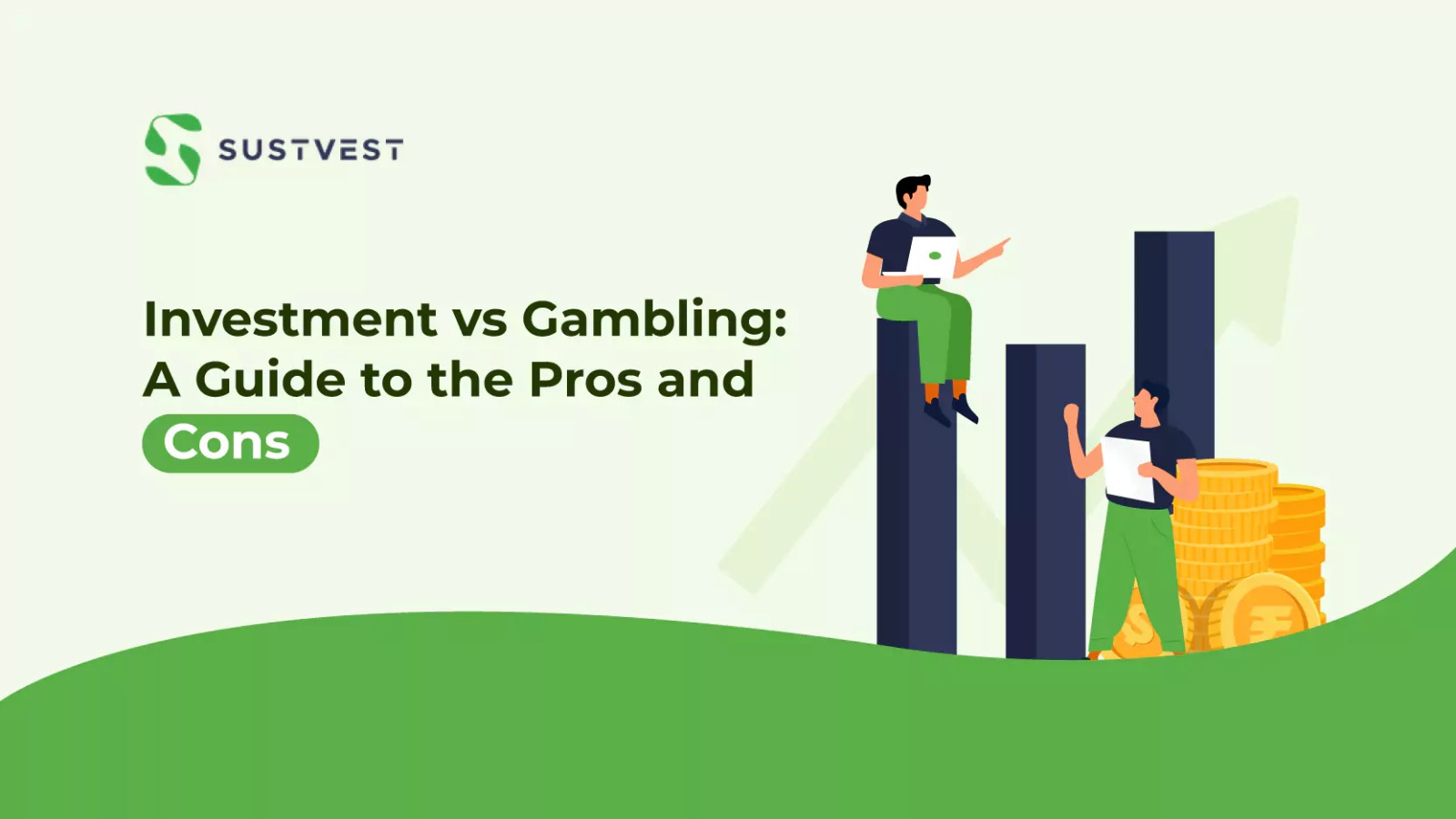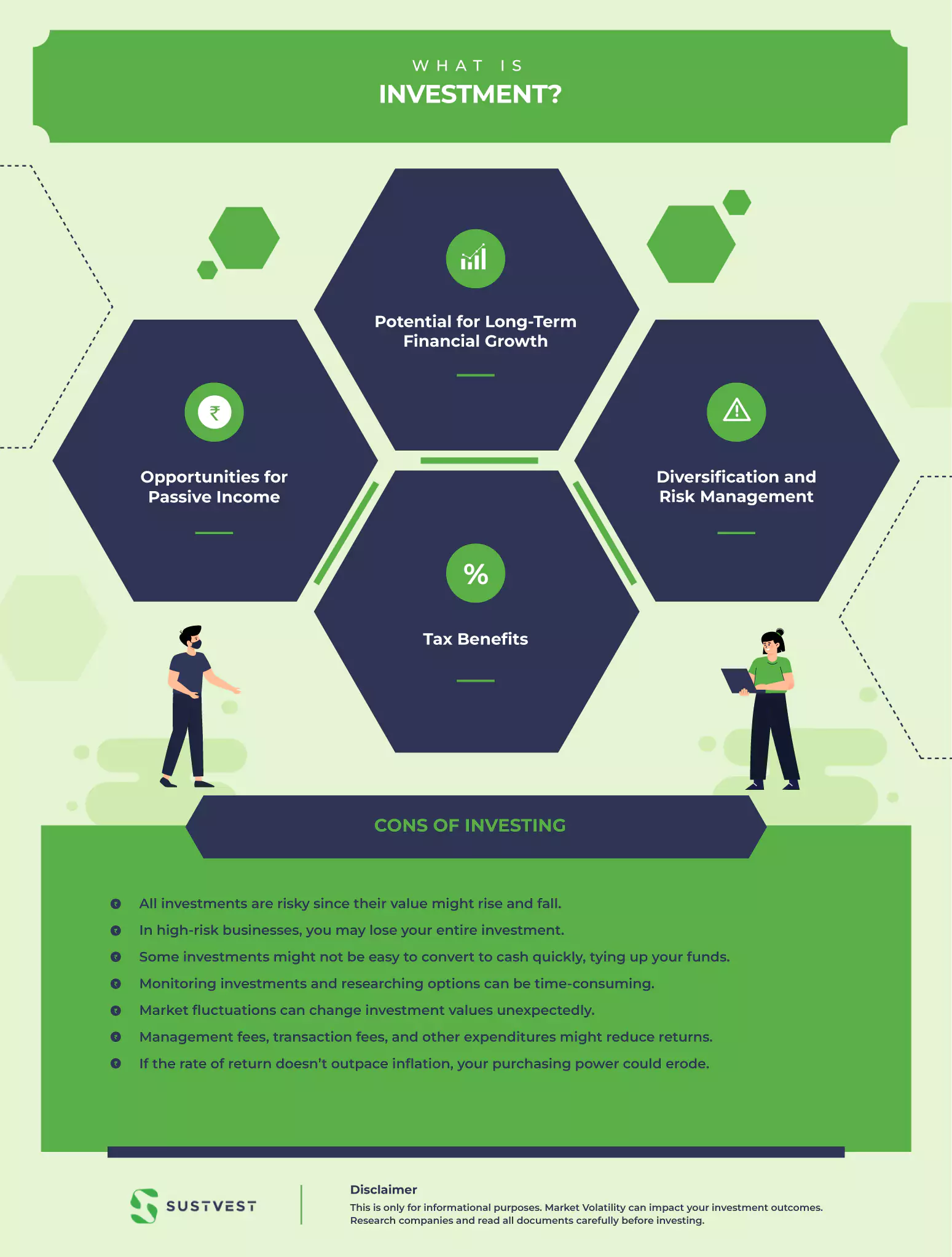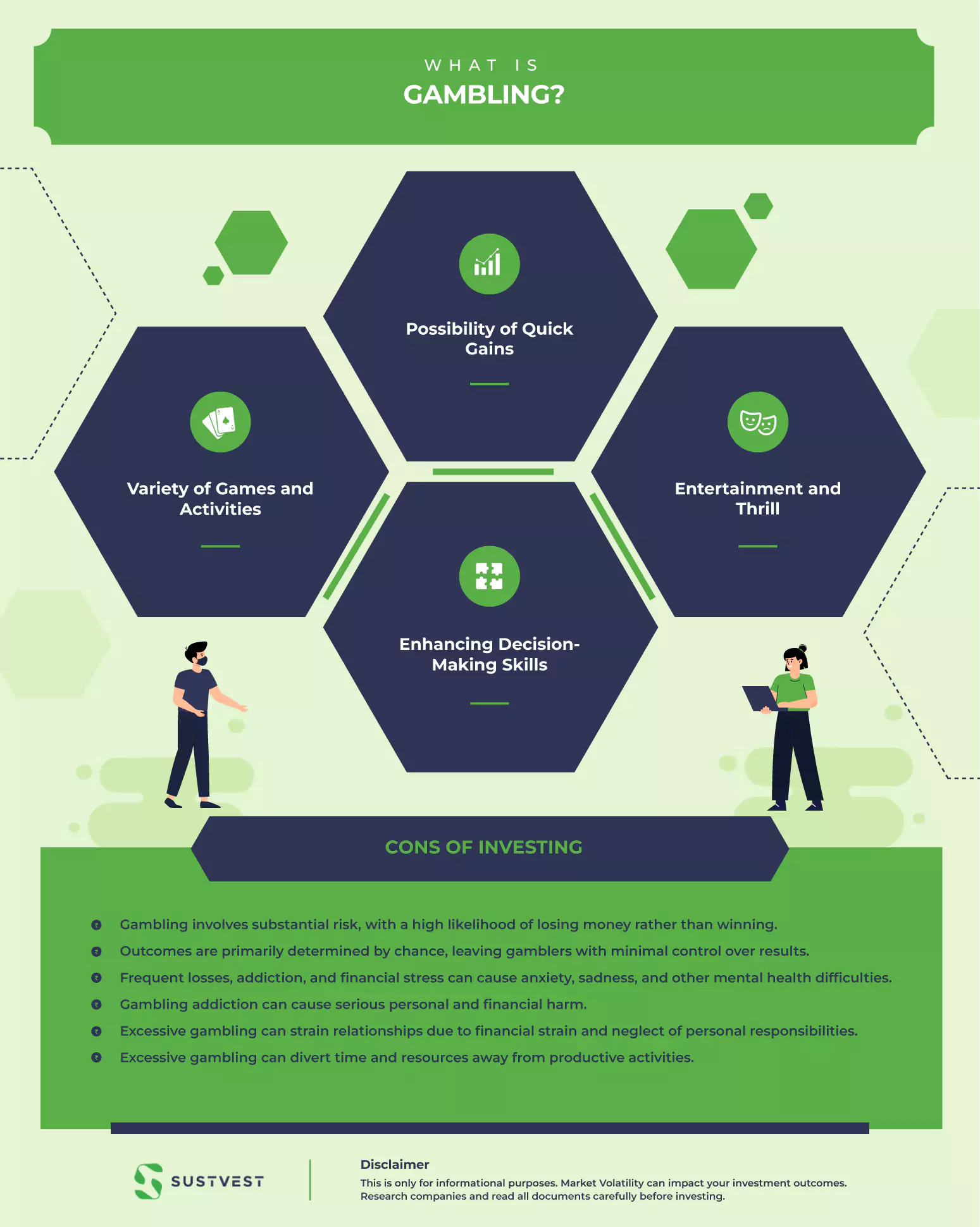Imagine standing at a crossroads, where one path leads to careful planning and growth, and the other to risk and uncertainty.
That’s the choice you face in the world of finance, especially when it comes to investment vs speculation vs gambling.
Investing is like nurturing a garden for continual growth, while gambling is akin to chasing a lottery win, thrilling but perilous. Speculation? It’s somewhere in between.
If these terms sound confusing, don’t worry!
In this simple guide, we’ll explore each concept, helping you understand its nuances and decide the path that aligns with your goals and dreams.
Join us, and let’s demystify these financial terms together!

What Is Investment?
Investment entails allocating funds to assets with the goal of generating long-term returns, primarily driven by careful analysis, research, and risk management. It involves calculated decisions based on an asset’s intrinsic value and potential for growth.
Now the question arises, is there a difference between investment and speculation?
Yes, Investment is different from speculation. Investment involves higher risks and a short-term focus on price fluctuations rather than underlying value.
On the other hand, there is a question — how does speculation work, well speculation involves making financial decisions based on forecasts about future asset price movements.
Investors speculate by buying or selling assets with the aim of profiting from anticipated price changes.
While both activities involve uncertainty, investment aims for consistent, sustainable gains, while speculation seeks quick profits from market volatility.
Understanding investments goes beyond just stocks and bonds. It leads us to ask, Investment – Function, Concept, And Everything You Need To Know.
Pros of Investment
The pros of investment are manifold, making it a favoured approach for growing wealth and securing financial futures.
Here are some key advantages of investment:
1. Potential for Long-Term Financial Growth
Investment holds the promise of long-term financial growth, where assets like stocks, bonds, and real estate can appreciate in value over time.
Through the effect of compounding, initial investments can generate substantial returns, fostering wealth accumulation.
This potential for growth distinguishes investment from other financial activities and underlines its significance in creating a secure financial foundation for the future.
If you’re intrigued by the prospects of financial growth, you might want to explore the 12 Best Investment Tips For Long-Term in 2023.
2. Diversification and Risk Management
Diversification is a key benefit of investment. It involves spreading your money across different types of assets like stocks, bonds, and real estate.
This strategy reduces the impact of poor performance in any single investment. By not putting all your eggs in one basket, you minimise the risk of substantial losses.
If one sector or market falters, gains in other areas can help balance the overall impact. This enhances your portfolio’s resilience and your ability to weather market fluctuations.
3. Opportunities for Passive Income
Certain investments, like dividend-paying stocks, real estate properties, and bonds, offer avenues for generating passive income. Passive income refers to earnings received regularly with minimal effort or direct involvement.
Investors receive regular payouts from these investments, which can be particularly valuable during retirement or as an additional income source.
This steady income stream enhances financial stability and reduces dependence solely on active employment for financial sustenance.
4. Tax Benefits
Many investment avenues come with tax advantages, such as deferred taxation on earnings and preferential capital gains rates. These benefits can lead to significant tax savings, enhancing overall investment returns.
By taking advantage of tax-efficient investment vehicles, individuals can optimise their financial strategies.
They can also reduce their tax liabilities and allocate more resources toward wealth accumulation and achieving their long-term goals.
Cons of Investing
Herein lies certain disadvantages associated with investment:
- All investments are risky since their value might rise and fall.
- In high-risk businesses, you may lose your entire investment.
- Some investments might not be easy to convert to cash quickly, tying up your funds.
- Monitoring investments and researching options can be time-consuming.
- Market fluctuations can change investment values unexpectedly.
- Management fees, transaction fees, and other expenditures might reduce returns.
- If the rate of return doesn’t outpace inflation, your purchasing power could erode.

What is Gambling?
Gambling involves wagering money or valuables on uncertain outcomes, typically in games of chance. It’s characterised by risking resources with the hope of gaining more, but the result is heavily dependent on luck rather than skill or knowledge.
Gambling can encompass activities like casino games, lotteries, and sports betting. While it can provide moments of excitement, it lacks the strategic planning and research associated with investments.
In essence, gambling vs speculation, gambling leans heavily on chance without the structured approach that speculation, or informed risk-taking, entails.
Pros of Gambling
While gambling offers certain allures, it’s important to recognise that inherent risks often overshadow the potential benefits.
However, here are some perceived pros of gambling:
1. Possibility of Quick Gains
Gambling offers the allure of rapid financial gains, where a relatively small investment can lead to substantial returns. This quick-profit potential is particularly appealing to individuals seeking immediate financial gratification.
However, it’s crucial to recognise that these gains are highly unpredictable and often occur infrequently.
The pursuit of quick gains can also lead to reckless decision-making and significant losses, making it a risky approach to wealth accumulation compared to more structured and informed financial strategies.
2. Entertainment and Thrill
Gambling is seen as a way to have fun and feel excited. People enjoy the feeling of not knowing what will happen next in games like casinos or betting. It’s a bit like going on a roller coaster – the uncertainty makes it interesting.
But, just like a roller coaster has risks, gambling also has risks. There is a risk of losing money and getting too caught up in the excitement. It’s important to be careful and not let the fun become a problem.
3. Variety of Games and Activities
Gambling offers a wide spectrum of games and activities that cater to diverse interests and preferences.
From traditional casino games like slot machines, poker, and roulette to sports betting and online platforms, individuals can engage in activities that align with their entertainment choices.
This variety can provide an avenue for individuals to explore different forms of excitement and engagement.
However, it’s crucial to remember that this diversity doesn’t mitigate the fundamental risks associated with gambling, including the potential for financial loss and negative psychological impacts.
4. Enhancing Decision-Making Skills
Certain forms of gambling, such as poker or blackjack, require players to make strategic decisions under pressure.
Analysing odds, reading opponents, and managing risks in real-time situations can sharpen cognitive skills like critical thinking, probability assessment, and emotional control.
Cons of Gambling
The following points present the disadvantages associated with gambling:
- Gambling involves substantial risk, with a high likelihood of losing money rather than winning.
- Outcomes are primarily determined by chance, leaving gamblers with minimal control over results.
- Frequent losses, addiction, and financial stress can cause anxiety, sadness, and other mental health difficulties.
- Gambling addiction can cause serious personal and financial harm.
- Excessive gambling can strain relationships due to financial strain and neglect of personal responsibilities.
- Excessive gambling can divert time and resources away from productive activities.

Key Difference Between Investing and Gambling
The key difference between investing and gambling lies in their fundamental nature and purpose. Investing is grounded in strategic planning, research, and informed decision-making to achieve long-term financial growth and stability.
In contrast, gambling relies on chance and luck for short-term gains, often without a structured approach. While both involve risk, investments are generally based on analysis and have the potential for sustainable returns, whereas gambling leans heavily on unpredictable outcomes.
Here is the table summarising the key differences:
| Aspect | Investing | Gambling |
| Approach | Informed, strategic planning | Relies on chance and luck |
| Time Horizon | Long-term growth and stability | Short-term, immediate gains |
| Decision-Making | Research and analysis | Emotions and chance |
| Risk Management | Diversification and strategy | Uncertain outcomes |
| Intent | Wealth accumulation | Short-term profit |
Faqs: Difference Between Investment and Speculation and Gambling
Can gambling strategies be applied to investing?
While both involve risk, gambling’s reliance on luck contrasts with investing’s focus on research, analysis, and calculated risk for sustainable returns.
How are stock speculators different from stock investors
Stock speculators focus on short-term price fluctuations, seeking quick profits. Stock investors prioritise long-term growth, analysing fundamentals and aiming to build wealth over time.
What’s the role of knowledge in investment and gambling?
Knowledge is crucial in investment, guiding informed choices. In gambling, luck plays a bigger role, often overshadowing knowledge and analysis.
Can gambling in stocks be profitable like investing?
While luck can lead to gains in gambling, sustained profits come from informed investing driven by research, risk management, and a diversified portfolio.
What is Speculation?
Speculation is making high-risk investments in the hope of significant short-term financial gain, often involving a degree of uncertainty or gambling on market fluctuations.
To Sum Up
The distinction between investment and gambling lies in informed decision-making and calculated risk. Investment involves research, analysis, and a long-term perspective, aiming for growth.
Gambling, however, relies on chance and often leads to uncertain outcomes. To secure financial well-being, choosing investment over gambling is prudent.
For additional peace of mind in your investment journey, consider learning about Asset Backed Security: Everything You Need to Know to Protect Your Assets.
Remember, the SustVest platform can guide you toward sustainable and informed investment choices, promoting both profit and responsible financial practices.

Founder of Sustvest
Hardik completed his B.Tech from BITS Pilani. Keeping the current global scenario, the growth of renewable energy in mind, and people looking for investment opportunities in mind he founded SustVest ( formerly, Solar Grid X ) in 2018. This venture led him to achieve the ‘Emerging Fintech Talent of the Year in MENA region ‘ in October 2019.




